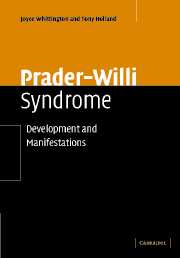Book contents
- Frontmatter
- Contents
- Preface
- Acknowledgements
- Part I Background: Prader—Willi syndrome, why, what, and how to investigate
- Part II Prader—Willi syndrome prevalence, phenotypic functioning and characteristics
- 4 Prevalence, birth incidence and mortality
- 5 Relationship between genetic and clinical diagnosis
- 6 Phenotypic differences between the genetic subtypes
- 7 Cognitive function and attainments
- 8 The behavioural phenotype of PWS
- 9 Medical conditions affecting people with PWS
- 10 Psychiatric illness
- 11 Obsessions and compulsions
- Part III Minor findings, some conclusions and future directions
- Index
11 - Obsessions and compulsions
from Part II - Prader—Willi syndrome prevalence, phenotypic functioning and characteristics
Published online by Cambridge University Press: 13 August 2009
- Frontmatter
- Contents
- Preface
- Acknowledgements
- Part I Background: Prader—Willi syndrome, why, what, and how to investigate
- Part II Prader—Willi syndrome prevalence, phenotypic functioning and characteristics
- 4 Prevalence, birth incidence and mortality
- 5 Relationship between genetic and clinical diagnosis
- 6 Phenotypic differences between the genetic subtypes
- 7 Cognitive function and attainments
- 8 The behavioural phenotype of PWS
- 9 Medical conditions affecting people with PWS
- 10 Psychiatric illness
- 11 Obsessions and compulsions
- Part III Minor findings, some conclusions and future directions
- Index
Summary
Several psychiatric conditions have been associated with PWS. As noted in Chapter 10, increased risk rates have been proposed for psychotic illness and obsessive—compulsive disorder (OCD). This chapter is concerned with the latter. Obsessive—compulsive behaviour has long been recognised as part of the PWS phenotype and it is generally agreed that people with PWS have ‘obsessive personalities’, but this is not the same as OCD.
While some reports on the obsessive—compulsive behaviour in PWS have raised the possibility of heightened rates of OCD in this population, the difficulties of psychiatric diagnosis in people with learning disabilities (LD) seem to have discouraged attempts at quantification in PWS, although there are several estimates of prevalence in undifferentiated groups of people with LD. Exceptionally, the 1996 paper by Dykens, Leckman & Cassidy does seek to elucidate the nature of the obsessive—compulsive behaviour by people with PWS. We describe this paper in detail since, as well as being the most thorough investigation of obsessive—compulsive behaviour in PWS of the last decade, it raises several interesting issues.
In DSM-IV a diagnosis of OCD presumes the presence of either obsessions (intrusive, recurrent thoughts or images that exceed real-life worries) or compulsions (repetitive behaviours that a person is driven to perform in response to an obsessional thought or set of rigid rules).
- Type
- Chapter
- Information
- Prader-Willi SyndromeDevelopment and Manifestations, pp. 188 - 198Publisher: Cambridge University PressPrint publication year: 2004



